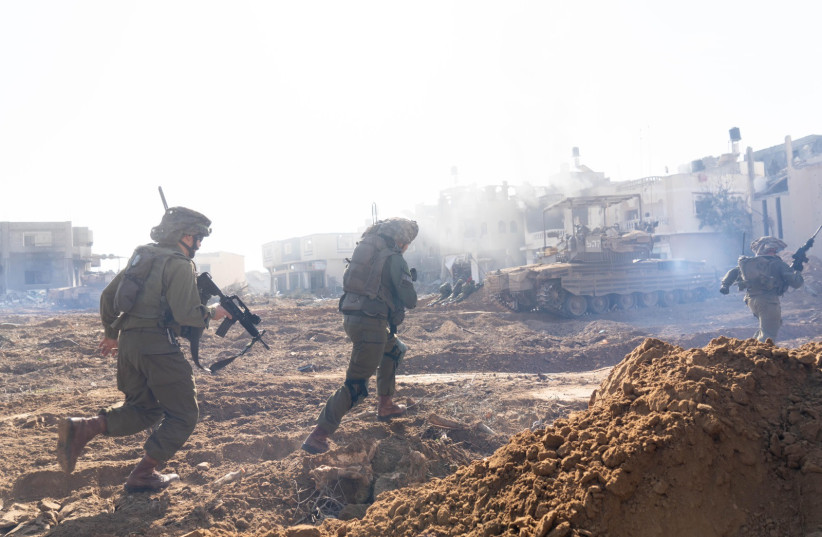IDF Maj. Meytar Shilon, a 27-year-old Company Commander in the Kfir Brigade, is now readjusting to civilian life. His brigade is one of several that was pulled out of Gaza in recent days, after spending more than two months fighting in the Strip.
A third-year law student, he, like many other Israelis, was called up following the October 7 Hamas attack.
“This is our first mobilization to Gaza since this brigade was established. It took 19 years and 9 years for me personally as an officer, so this is very significant,” Shilon told The Jerusalem Post after exiting Gaza.
At the onset of the war, Shilon’s unit was serving in Shejaia in the Northern Gaza Strip, a site of intense clashes.
“We were fighting an enemy above and below ground – killing terrorists, destroying terror infrastructure and tunnels in collaboration with other special forces,” he said.
"A cowardly enemy that emerged from tunnels," ambushes, and booby traps
Shilon recounted the initial days of fighting and said that his soldiers spent the first few days familiarizing themselves with the difficult and crowded urban neighborhood in Shejaia.
“We arrived with limited knowledge of the terrain, into very intense fighting in dense neighborhoods and residential areas where terrorists were hiding,” he said. “We encountered a cowardly enemy that emerged from tunnels underground
for short periods and tried to harm us with ambushes and booby traps and then would either try to run away or run back underground.”
Shilon described one of the “more significant events” during his service in Shejaia, when his unit encountered a Hamas terrorist cell.
“We encountered five terrorists and engaged in an intense battle,” he said. “With the help of the air force and tanks we were able to eventually eliminate this cell.”
He also addressed the massive amounts of weapons, missiles, missile launchers and more that his unit uncovered.
“One of the most incredible stories – and I mean in a bad way – is that we entered an elementary school in Shejaia. We entered the school to clear it of enemies and what we found was a tunnel right next to the school,” he said. “We entered the tunnel and were immediately attacked by explosive devices.”
“You can see a classroom with birthday signs for the kids and right alongside massive explosives that are being used against our soldiers,” he said. “You see just how they take an innocent structure like an elementary school meant to teach kids until 6th grade and they turn it into a fighting base for a brutal enemy that cynically uses schools and children.”
Shilon said this was just one example, and there were many more.
“In another school in Shejaia we found an incredible amount of ammunition being stored – from anti-tank missiles to weapons, really anything you can imagine – we found it inside the school.”
After over a month in Shejaia the brigade was allowed leave for four days before being redeployed to the Hamas stronghold of Khan Yunis in the southern Strip.
.

In Khan Younis, better-known terrain, but a more organized enemy
“When we returned to Khan Yunis, we saw how the soldiers better understood the terrain and the enemy,” he said. “Every area has its own difficulties – while Shejaia was denser, Khan Yunis had more structure, bigger neighborhoods, with high residential buildings. We had to adapt our strategy to act.”
“We also saw that the enemy was much more organized here,” he said.
Indeed, Defense Minister Yoav Gallant has said that the IDF believes Hamas leadership is hiding in or under Khan Yunis – one of Hamas’s main strongholds.
“The fighting more closely resembled that of Shejaia after the first few days,” Shilon said. “Still in both areas we saw the same cowardly enemy emerging from underground tunnels like mice.”
Yet, in Khan Yunis, Shilon’s brigade suffered a tragic loss. One of his soldiers, 19-year-old Sgt. Roi Tal, fell in battle.
“Roi was the first to enter a room of a house where a terrorist was hiding and he was killed,” he said.
The loss, while tragic and difficult, did not deter Shilon or his soldiers from continuing their mission.
“Throughout all our tour, throughout all the fighting, our unit was exceptional and professional,” he said. “This was our first deployment to Gaza, and we feel we are ready for any assignment in the future whether going back to Gaza, or in the West Bank or the North.”
“Nobody wants war, but this war is a just war. We are fighting so that every Jew in the world knows he has a safe place in Israel in any stage of his life. This is our mission, and we have every intention to complete it successfully,” he added.
